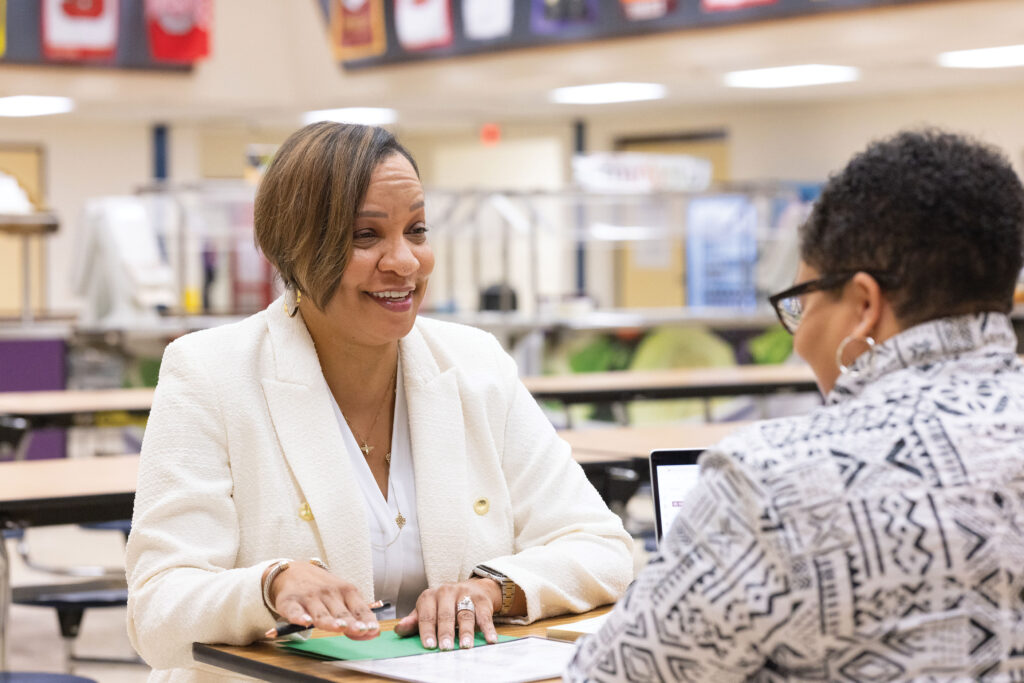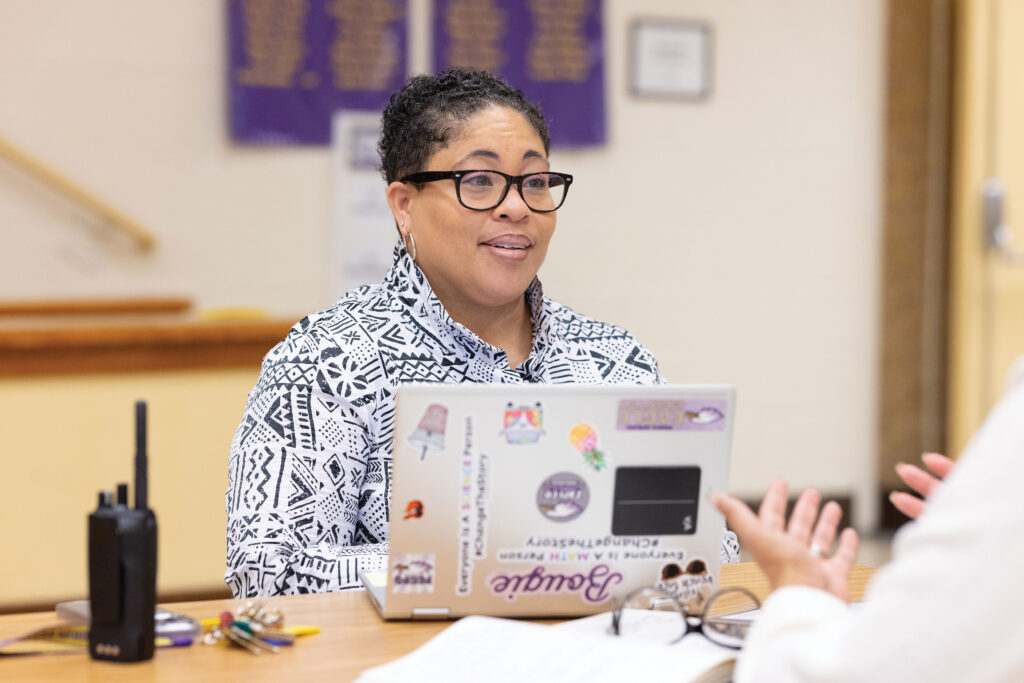Meaningful Mentoring

Travis Burns remembers what it was like when he first became a principal more than 20 years ago. “I got the keys to the building and was told ‘good luck,’” he says. “I didn’t have a formal mentorship program or someone I could talk to confidentially about issues that came up. For those who did have a mentor, it tended to be someone who was your supervisor.”

That lack of a solid early-career support system is why Burns is so excited to be part of the Virginia Principal Mentoring Pilot, a new initiative that brings together new principals with veterans like Burns in a formal, structured program designed to give the new leaders a guiding hand. A former president of the Virginia Association of Secondary School Principals (VASSP) and current principal of Northumberland High School in Heathsville, VA, Burns is one of six veteran school leaders working with a cadre of 12 new principals around the state as part of a six-month mentorship pilot program.
It’s all about making sure the new principals are successful. He doesn’t want them just getting the keys and then facing the challenges of a difficult job alone like he did. “We know it’s tough and we want them to stay,” Burns says. “We don’t want them jumping ship or pursuing other careers. We want them to stay for the long haul.”
A New Perspective
Katherine Duncan is one of those new principals. In her second year at James Madison Middle School in Roanoke, she was assigned a mentor this past summer when the pilot program began. As the program nears the end of the six months, she’s even more satisfied with it than she expected. “I’m always interested in learning more,” she says. “It’s nice to have someone to bounce ideas off and ask them questions. And since it’s not a colleague, that advice comes from a different perspective.”
Duncan was especially pleased with the structure of the program, where the specific research-based modules the participants complete remind her of being in a college classroom. “I don’t know if it’s a coincidence, but many of the things we’re working on are aligned with what’s happening in our district’s schools.” For example, she notes, one of the first topics they talked about was setting a vision for your school, and she already had her instructional leadership team collaborating on creating one.

A vital aspect of the program, according to mentors and mentees alike, is that it has nothing to do with job performance or evaluation. That allows for transparency and vulnerability, says mentor Jennifer Rucker, the director of alternative programs, student support, and wellness for Henrico County Public Schools and a former middle school principal. “I’ve always said that when you sit in the principalship, it’s a lonely place. You’re the singular person in that building with responsibility. So, my hope is that the principals I support will feel comfortable sharing some of their struggles. I try to talk them through the steps to get through those challenges and, at the same time, encourage them to be a strong leader and believe in themselves.”
Decades in the Making
The Virginia Principal Mentoring Pilot has been decades in the making. The state had a similar program when Mark Warner was governor in the early 2000s. But that program was discontinued. Even before then, however, VASSP had been “beating the drum” for such a program, according to VASSP Chief Executive Officer Randy Barrack. “We have long worked with superintendents to establish some kind of avenue to work with new principals,” he says. “There’s been growing concern that the preparatory programs for new principals in Virginia aren’t always sufficient. So, we get principals taking positions and failing, and they end up being reassigned or fired. That’s not good for anyone.”
When Lisa Coons took over as the Virginia superintendent of public instruction in 2023, she expressed a desire to work with VASSP and the Virginia Association of Elementary School Principals on developing a mentoring program. Those discussions led to the pilot program, which current and former VASSP officials played a central role in developing, including Barrack, Senior Project Director Roger Jones, and Secondary Lead Trainer Carol Robinson.
A vital aspect of the program, according to mentors and mentees alike, is that it has nothing to do with job performance or evaluation.
The initial proposal presented by VASSP and VAESP focused around one pilot that combined elementary and secondary (middle and high) school principals. Further discussion, however, resulted in VAESP developing a curriculum for elementary principals and VASSP developing a curriculum for middle and high school principals.
“One of the things I constantly saw was that when you get into a new school, or you’re in the principalship for the first time, you get inundated with the day-to-day activities. You get so absorbed in making it through the day that you lose sight of the big picture,” says Jones, a former VASSP president. “We wanted to put together a curriculum and a mentoring program that focused on helping principals stay focused on those things that the research clearly shows matter. So, one of the elements of the secondary curriculum is strategic thinking, which is driven initially by your vision. A lot of schools have a vision, but they don’t live it, and they don’t make decisions around it.”

In addition to strategic thinking, the remaining elements of the secondary curriculum include a focus on strength-based leadership, building culture, and leading learning. Building Ranks and What the Research Shows: Building Ranks in Action, both NASSP publications, provide foundational support for the secondary curriculum.
Jones and Robinson, also a former VASSP president, developed an additional curriculum just for secondary mentors. Mentors received specialized training throughout the pilot designed to guide interactions and communications with their mentees, prepare them for the challenges that today’s new principals must face, and help them realize their roles as real-time resources through weekly virtual check-ins and monthly on-site school visits. The mentors attended monthly trainings developed for principals; training modules always centered the growth and development of new school leaders. Mentors also met twice each month with the project director and the lead trainer to share feedback and suggestions for improving the curriculum.
Worthwhile Professional Development
Jennelle Burden is now in her second year at Churchland High School in Portsmouth after being paired with a mentor over the summer. “What I loved immediately about the program was that it’s really focused on growing you specifically as a leader and using your strengths,” she says. “A lot of times as administrators, you get professional development that’s more about the breadth of your job, like special education or discipline, for example. This program really focuses on growing you as a leader, including both hard and soft skills. There are times when we go to a PD session, and we have the sense when we walk away that it’s time wasted. For me, this has been incredibly intentional and strategic. And I felt like every second, whether it’s the 10-minute check in, the in-person meetings, or the things that we’ve done in person with the whole group, has been incredibly beneficial.”
As the pilot comes to an end in early 2025, there’s strong agreement among the participants that it should not only continue but also expand significantly. Much of that, of course, depends on state funding. Most local districts don’t have available funding to support the program, and it will require action by the state legislature to make it permanent.
“My hope is that we could have a cadre of mentors who are properly trained and certified, and available to all 131 districts in Virginia so superintendents can identify principals to get the additional support the program offers,” Barrack says. “We have mentors for teachers. But we need them for principals, and we need funds to make that available.”
Rucker reiterates the idea that the program offers real help in retaining principals. “When we talk about the struggles we’re having in education with retention, it usually relates to teachers, but we also have a concern about the leaders in our buildings,” she says. “We want to make sure we retain the highest quality individual in these very important positions alongside our teachers and alongside our superintendents. It will help with retention, and it will actually attract more people to the principalship if there is something like this in place.”
Dan Gursky is a freelance education writer and editor based in Washington, D.C.
